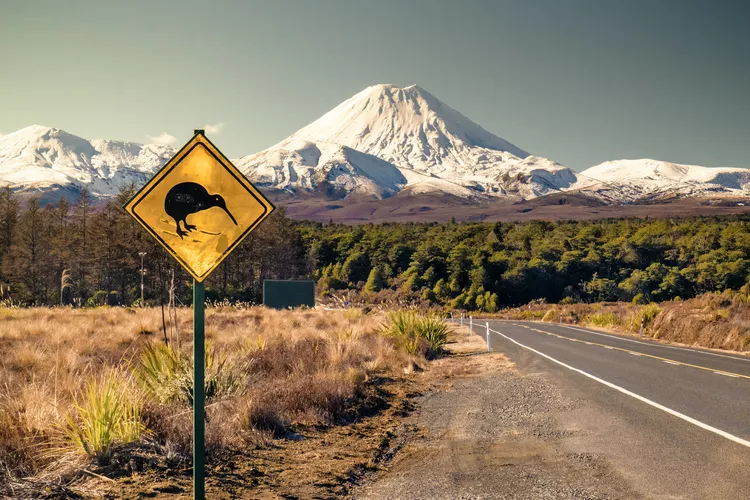Summary of New Zealand’s Kiwi Houses and Sanctuaries
- Kiwi North Kiwi House
- Auckland Zoo
- Rainbow Springs Nature Park
- Te Puia Kiwi House
- Otorohanga Kiwi House
- National Aquarium of New Zealand
- Ngā Manu Nature Reserve
- Pukaha Mount Bruce National Wildlife Centre
- Wellington Zoo
- Orana Wildlife Park
- National Kiwi Centre, Hokitika
- Willowbank Wildlife Reserve
- West Coast Wildlife Centre
- Kiwi Birdlife Park
The kiwi, New Zealand’s national bird, can be hard to find in the wild. Deforestation and various predators have drastically reduced populations of this small nocturnal bird. However, you can still make spotting one a goal during your trip. Special “houses” around the country simulate the dark, damp conditions of their natural habitat, allowing visitors to glimpse this fascinating flightless bird. Most kiwi houses and sanctuaries operate active breeding and hatching programs while offering tours and valuable information about this enigmatic creature.
Kiwi North Kiwi House (Whangarei, Northland, North Island)
:max_bytes(150000):strip_icc():format(webp)/Otorohanga_kiwi_house_-_panoramio-5be4c09c46e0fb0026fe68c7.jpg)
At Kiwi North in Northland, you can discover unique wildlife, including a state-of-the-art kiwi house where you can observe the birds foraging for food as they do in the wild. Additionally, you will encounter the tuatara, New Zealand’s native reptile, the morepork (or ruru), which is the national owl, and endemic gecko species. Moreover, don’t forget to visit the adjacent Whangarei Museum and the historic buildings within the 25-hectare Heritage Park.
Auckland Zoo (Auckland, North Island)
:max_bytes(150000):strip_icc():format(webp)/IMG_3799WEB-41a43bd038b04b59ac532548e49eae80.jpg)
Located in New Zealand’s largest city, Auckland Zoo features a display called “The Night,” showcasing several of New Zealand’s lesser-known nocturnal creatures, including the endangered North Island brown kiwi. The zoo has been prominent in kiwi conservation efforts and participates in a kiwi recovery program named O.N.E., Operation Nest Egg, which involves hatching eggs in captivity and raising birds on predator-free islands until they’re ready for release into the wild.
Rainbow Springs Nature Park (Rotorua, North Island)
Your admission to this essential research and breeding center includes a guided tour of the nocturnal kiwi enclosure. The Kiwi Encounter program gives you the chance to sponsor a kiwi chick, which adds a personal touch to the conservation experience. Notably, the park’s conservation efforts significantly enhance the survival rate of kiwis in the wild, increasing from a mere 5% to an impressive 70%.
Te Puia Kiwi House (Rotorua, North Island)
:max_bytes(150000):strip_icc():format(webp)/8511054357_5e66d556c9_k-5be4c30046e0fb0051425bdd.jpg)
Recognized as one of the oldest kiwi houses in New Zealand, Te Puia Kiwi House is part of the remarkable Te Whakarewarewa Valley geothermal complex. This venue not only houses a kiwi house but also provides a cultural introduction to traditional Māori culture, offering a comprehensive experience for visitors.
Otorohanga Kiwi House and Native Bird Park (Lower North Island)
:max_bytes(150000):strip_icc():format(webp)/GettyImages-148665735-5be4c4a0c9e77c00514c0ad5.jpg)
The Otorohanga Kiwi House is well-known for its nocturnal enclosures, allowing visitors to observe North Island brown kiwis and participate in kiwi-watching night tours, which present a more natural viewing experience. Visitors can also see other species such as the great spotted kiwi and the little spotted kiwi in this fantastic setting.
National Aquarium of New Zealand (Napier, North Island)
:max_bytes(150000):strip_icc():format(webp)/GettyImages-175839541-5be4c5f0c9e77c00512c391d.jpg)
At the National Aquarium of New Zealand, day transforms into night for the kiwi house, enabling enhanced visibility for visitors. The aquarium replicates their native habitat, complete with bush-like surroundings and regularly collected plantings, allowing for an immersive experience.
Ngā Manu Nature Reserve (Kapiti Coast, north of Wellington, North Island)
This reserve features a range of native plants and animals set in what was once a coastal swamp forest. Visitors have the opportunity to learn about local wildlife through guided tours. Consequently, families can participate in the Kiwi Guardians program, engaging children in conservation efforts through fun activities and rewards.
Pukaha Mount Bruce National Wildlife Centre (Wairarapa, North Island)
:max_bytes(150000):strip_icc():format(webp)/GettyImages-523600122-5be4d015c9e77c0026e6f9ff.jpg)
Pukaha Mount Bruce is dedicated to breeding New Zealand’s endangered birds, including the kiwi. The facility achieved a remarkable milestone by breeding a known white kiwi in 2011. Visitors can explore native forest walks, guided tours, and educational displays dedicated to avian conservation efforts.
Wellington Zoo (Wellington, North Island)
The Twilight Te Ao Māhina nocturnal house at Wellington Zoo features three brown kiwis. During the daily Kiwi Talk program, visitors can get up close to Tahi, a renowned kiwi known for being one-legged, offering a unique opportunity to learn more about these fascinating birds.
Orana Wildlife Park (Christchurch, South Island)
:max_bytes(150000):strip_icc():format(webp)/GettyImages-521663364-5be4d2fcc9e77c00512ed86d.jpg)
This expansive 80-hectare park is the only open-range zoo in New Zealand, featuring a nocturnal house housing kiwi and the native owl, the morepork. During daily feeding sessions, visitors can observe these unique birds as they forage for food while learning from guides about their natural behaviors.
National Kiwi Centre, Hokitika (West Coast, South Island)
This center is focused on a breeding program for the rare Southern tokoeka kiwi. Visitors can become immersed in New Zealand’s wildlife experience, feeding giant eels that can live up to 100 years old and witnessing the ancient tuatara, often referred to as a living dinosaur.
Willowbank Wildlife Reserve (Christchurch, South Island)
:max_bytes(150000):strip_icc():format(webp)/10686299606_7022e07031_o-5be4d3e546e0fb0051221127.jpg)
Willowbank showcases a distinctive kiwi house, along with a series of trails exhibiting various native animals and birds. Visitors can explore a replica of a pre-European Māori village and engage in a variety of special events and tours highlighting the conservation and appreciation of New Zealand’s wildlife.
West Coast Wildlife Centre (Franz Josef, West Coast, South Island)
The centre offers a unique opportunity to participate in the Kiwi Backstage Pass program, providing guided tours through incubation and rearing facilities, showcasing kiwi chicks from October to March. With its dedication to preserving critically endangered species, the West Coast Wildlife Centre plays a crucial role in saving the Rowi and Haast tokoeka kiwis from extinction.
Kiwi Birdlife Park (Queenstown, South Island)
:max_bytes(150000):strip_icc():format(webp)/GettyImages-590534882-5be4d6b3c9e77c0051b49598.jpg)
Home to exceptional kiwi viewing opportunities, this park utilizes infrared cameras to guarantee sightings in their nocturnal house. Visitors can indulge in five daily feeding times during the summer and four during the winter, providing ample opportunity to connect with these unique birds.




